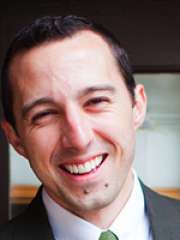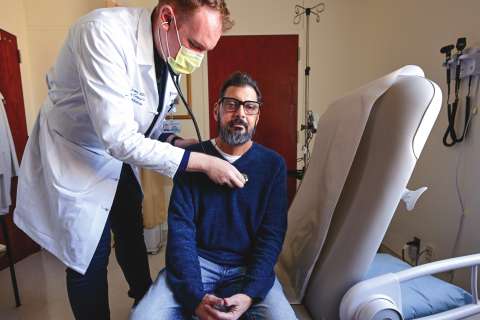Combining financial coaching for low-income parents with regular pediatric visits for their infants leads to fewer missed medical appointments, higher vaccination rates for children and greater financial health for families, a new study finds.
UCLA Health pediatrician Adam Schickedanz, MD, PhD, led the study, published Feb. 2 in the journal Pediatrics, which compared parents who received financial coaching during clinic visits with their infants to parents who did not receive coaching.
“In the first six months of receiving the (coaching) intervention, families are half as likely to no-show, so they’re much more likely to attend their well-child visits,” Dr. Schickedanz said in an interview.
Those parents also reported increased monthly household income and savings and their children were 25% more likely to be current on childhood vaccines compared to a control group.
Mixing financial coaching and health care
Dr. Schickedanz has been interested in how to address the root causes of poor health outcomes, particularly poverty, since his earliest days as a physician. In his first week of medical residency, two of his patients asked if he could help them find a job.
“My wife (Heather Bennett Schickedanz, MD) is a family physician, and we were both thinking: ‘What can we do in our own clinical practices to address poverty?’ because we saw so clearly that economic hardship was inextricably linked to our patients’ health. The daily financial stress many of our patients faced impacted nearly every facet of their health and health care. Despite how pervasive an influence poverty had on health, we felt like we were ill-equipped to respond,” he said.
“Like most physicians, we were trained in medical school not to bring financial or cost considerations into the clinical encounter, because that was quote-unquote unprofessional. That training blinded us to the ways we could concretely intervene to improve our patients’ financial circumstances and change those social determinants of health and material hardships like housing and food insecurity. We had to learn how to ‘treat’ poverty, just as we had learned to treat so many other disease risks and health conditions.”

While still a resident, Dr. Schickedanz had a chance conversation with a financial coach working with a nonprofit in San Francisco. That chat inspired Dr. Shickedanz and his wife to launch a pilot program there called Financial Fitness Clinic, which invited adult and pediatric patients facing financial challenges that impeded their health care to receive financial coaching alongside clinical visits with the doctors. Dr. Schickedanz termed the approach a “Medical-Financial Partnership” because it brought together financial and medical services to improve patient health.
When Dr. Schickedanz began his fellowship at UCLA Health in 2014, he established a similar Medical-Financial Partnership program in Los Angeles and began to study its outcomes.
The just-published study began in 2018 at Harbor-UCLA Medical Center with 81 parent-child pairs, who were randomized to either receive coaching during pediatric preventive-care visits or usual care. Data was collected through January 2020 to measure adherence to pediatric health care appointments. A concurrent study of the influence of financial coaching on participating parents’ health outcomes remains ongoing.
What is financial coaching?
Financial coaching is a “standardized, evidence-based and strengths-based approach to helping low-income families achieve their economic potential” by supporting families’ financial goals, budgeting and savings, and connecting them with anti-poverty services, Dr. Schickedanz and his colleagues explain in their study.
Research on financial coaching shows it reduces financial stress, increases income and savings, reduces debt and improves credit.
In Dr. Schickedanz’s study, parents received coaching during their infants’ regular well-child visits while they waited for the pediatrician. Coaching was provided in the exam room by trained social workers. Coaches also followed up with parents at least monthly, either in person during pediatric appointments or remotely by phone or text.
The coaches identified parents’ strengths and connected them with public benefits and cost-saving services such as free childcare, nutrition assistance and free tax preparation.
Parents who received coaching “significantly increased average monthly household income six months after enrollment compared to their baseline income” and reported higher income than control participants, the researchers found.
Parents who received coaching were also 20% more likely than parents in the control group to attend all their infants’ preventive care visits and 25% more likely to be up to date on the child’s vaccines.
“Our study suggests that addressing financial goals and needs can improve preventive visit care adherence and vaccinations,” the authors write.
They note that the medical-financial partnership “may have created greater trust in the health care team by virtue of the coaching approach and new motivation to attend clinic visits by offering clinic-based resources of interest to parents aligned with their self-identified financial goals.”
Encouraged by these results, Dr. Schickedanz and his colleagues are expanding the program beyond Harbor-UCLA Medical Center to include Olive View-UCLA Medical Center and other future locations, he said.
“It’s a testament to how much clinicians and their patients recognize the need for services like the Medical-Financial Partnership,” he said. “As soon as we have resources, there’s demand, with folks asking, ‘Can we try that out in our clinic? I think our families could really use it.’”




